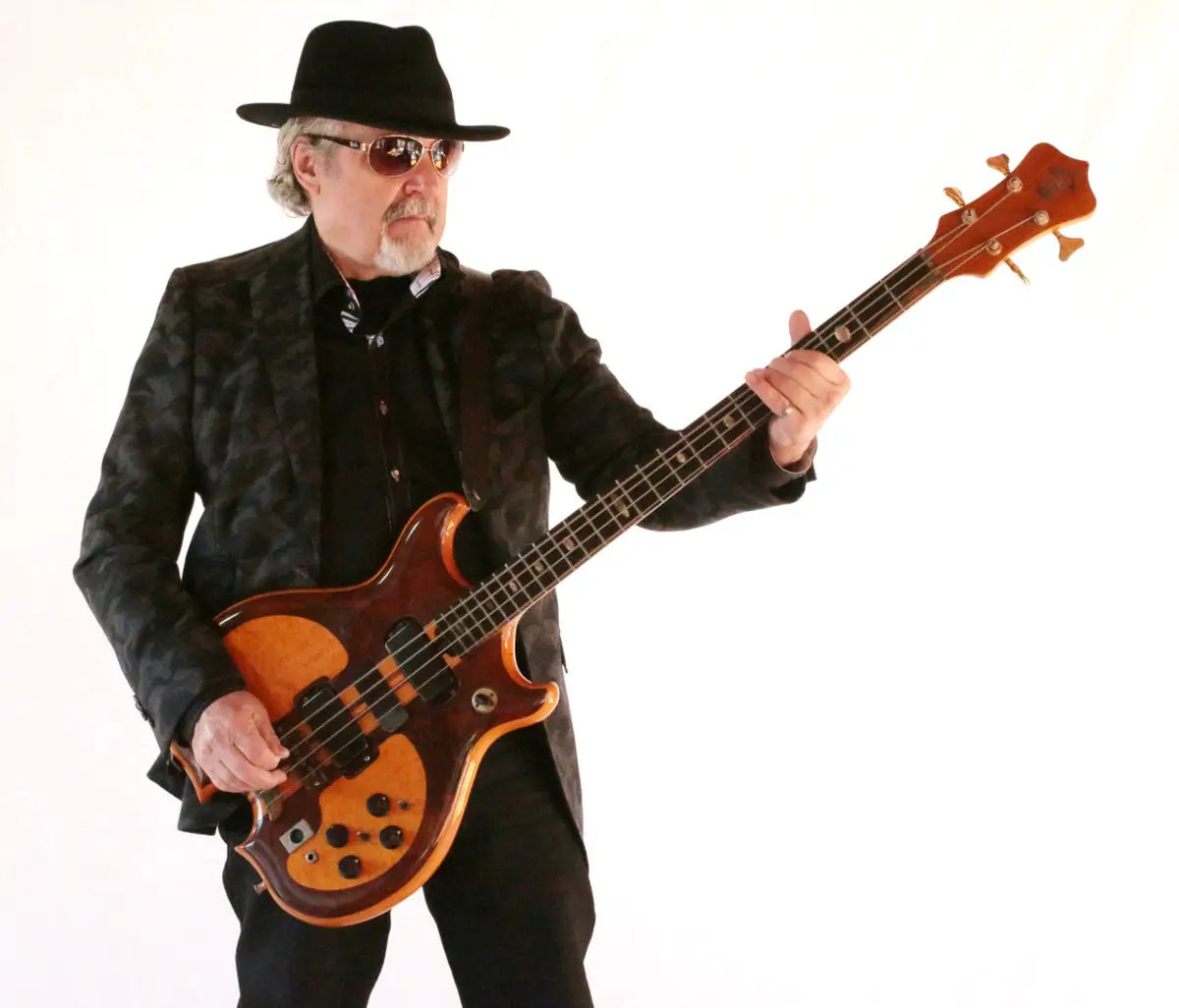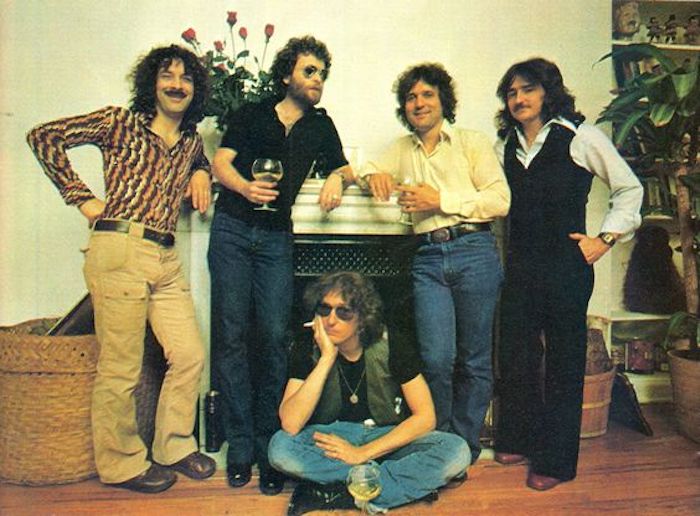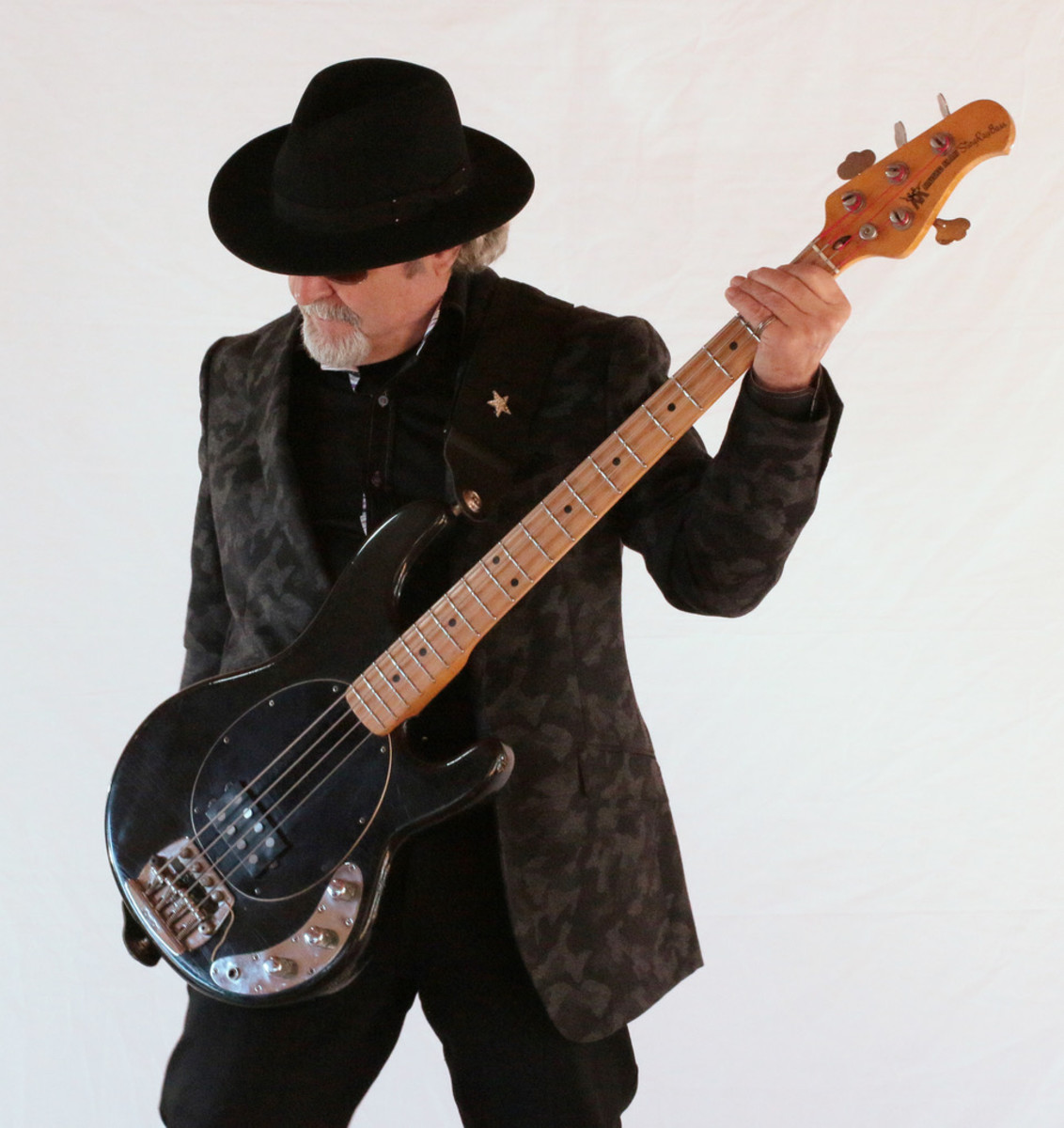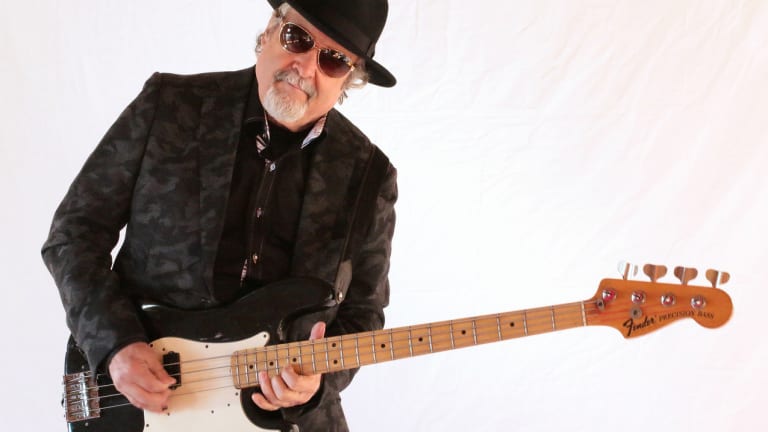
All images courtesy of Chipster PR
Having been in the game a long time, Joe Bouchard knows a thing or two about making a good Rock record. So, it’s no surprise that his new record, Strange Legends, is another Rock banger (check it out via his website here).
Joe was the long-time bassist of legendary Rock group Blue Öyster Cult, has had a successful solo career, and has worked on the production side of things, helping indie groups realize their dreams. Having working in so many sectors of the music business and also having the ability to play many instruments, you could say that Joe is something of a musical jack of all trades.
So, today I’ve Joe Bouchard with us. We talk about his early history in music, picking up the bass guitar, joining Blue Öyster Cult, and many more. Dig in.
Andrew:
Joe, thank you for taking the time to speak with us. How have you been holding up throughout the tumultuous events of the last year?
Joe:
I’m fine. The lockdown was freaky at first, but I’ve adjusted, and I’m getting a lot of creative work done. I knew it would be a long haul, like a year or two, and that was hard to wrap my head around at first. Now it’s just the way things are. I just got my first vaccine shot last Thursday and will get the second one in a month. It does give one a sense of optimism.
Last year we were abruptly cut off from gigs, which was a shock since that was what I did almost constantly for the past 60 years! I’ve filled in the time by promoting my solo album, playing guest spots on friends’ recordings, self-producing videos, and writing new songs. My cooking skills have greatly improved. I can make a killer omelet and love making Italian, Mexican, and Indian food.
Andrew:
Tell us about your backstory. How did you get into music? What was the gateway?
Joe:
My family was very musical. My mom was always singing, and my dad played guitar and harmonica. I have five brothers and one sister, and we all play instruments. I started playing piano at age nine and took up the trumpet at age 11 as preteens started a band with two trumpets and a snare drum called The Regal Tones. The long cold winter in upstate New York could be dull, so we made music. We eventually added guitars and more drums. We practiced in a neighbor’s basement and made quite a racket. Our first gig was playing on the sidewalk by my uncle’s house. Tourists would put spare change in a hat laid out on the street. From there, we graduated to playing dances for the boy scouts. It was great fun!
My most significant influence as a youngster was probably my Uncle Bill, a Jazz player who played local gigs on weekends. A real triple-threat guy, he played trumpet, piano, and guitar in a style that reminded me of Les Paul in the 1950s. He had several excellent Gibson guitars that he let us borrow from time to time. We were excited when he let us borrow his 1960 Fender Jazzmaster, the first year they came out. We all plugged into one amplifier, an old Gibson amp. Soon, we were off and running as gigging musicians.
Andrew:
As an artist, who were some of your earliest and more important influences? Specifically, what was the event that led you to pick up the bass?
Joe:
My most significant influence was The Ventures, who played guitar instrumentals as a beginning musician. No one wanted to sing, and The Ventures’ songs were easily played on guitar. We soon caught the surfing craze, and The Beach Boys were our heroes. Their singing was hard to replicate, but we attempted it anyway. After playing those songs and others we heard on the radio, The Beatles and Stones arrived, and we learned all their songs. Soon, we were booked almost every weekend for high school dances, parties, and other events. We got paid pretty well for a bunch of teenagers.
By the time I was a senior in high school, it was time to decide what career I might want. The only thing that made sense to me was music. I applied to study music education and ended up going to Ithaca College. I enrolled as a piano major because, in the 1960s, the guitar wasn’t treated as a “serious” instrument. I joined a working cover band the first week at college. Frat parties were even more lucrative than the high school dances we did. It was like Animal House every weekend.
After two years at Ithaca, I found myself on a hiatus from band work for a month or so. One weekend I saw an excellent Jazz band. I thought to myself, “I would do anything to get in that band.” I talked to their bass player in class next Monday morning, and he said he was leaving the band. A light bulb went off in my head, and I decided to approach the band leader, who was also my guitar teacher, convincing him I could play bass. I’d never played bass guitar, but I could fake it. That Jazz band had detailed bass charts, and I learned the history of 1960 basslines from those charts. Decades later, I realized those bass lines mainly were from songs The Wrecking Crew recorded.
Andrew:
Let’s talk about your newest album, Strange Legends. How did this album come together? What was the inspiration?
Joe:
Strange Legends is my 6th solo album. I started producing my own albums and other indie bands back in the early 1990s. As soon as the recording technology was invented for computer home recording, I was off and running. No longer were you at the mercy of renting a studio. You could do it all at home. Well, not really all of it. Real drums still need to be recorded in a real studio. You need a larger space than you have a home, and it helps to have a good engineer who knows how to balance the mics for a great drum sound.
Strange Legends was about a three-year project. It was inspired by coming up with some exciting new songs and a few songs from outside writers. One of the first songs I wrote was “The African Queen, ” which inspired me to push forward for a full album.
Andrew:
More on your new record. Who’s playing with you on this one? Any interesting session musicians to speak of?
Joe:
Mickey Curry, Bryan Adams’s long-time drummer, played all the drums. He is a fantastic drummer and has recorded with Alice Cooper, The Cult, Hall & Oates, and many more. He has a great natural feel, and his sessions were some of the easiest I ever did. I play almost everything else, including guitars, bass, pianos, organs, trumpet, mandolin, and synthesizers. I’ve been billing myself as a multi-instrumentalist, which is pretty accurate.
My girlfriend Joan plays guitar on one track called “Winter.” She was a student of Dave Van Ronk, a 60s Blues/Folk legend, and she is an expert in his fingerstyle guitar. I had recorded the guitars on the song “Winter,” but it lacked something. She played a fingerstyle guitar part on a Fender Strat, which was the magic ingredient for the track. I do all the singing, except for two background vocals where Joan sings the high parts.
Andrew:
How about the production side of things? Do you self-produce, or do you bring in outside voices to try and hone your sound? What goes into the decision either way?
Joe:
I self-produce all my solo work. It’s hard-wearing two hats. I’m the performer on the one hand, and I’m the strict taskmaster on the other hand. Luckily, I worked with many great producers in my Blue Öyster Cult days. Martin Birch, Tom Werman, and Bruce Fairbairn were standout producers, with widely different styles in the studio. Our manager Sandy Pearlman was a tremendous influence in the studio, David Lucas, on a musical level. When I’m recording a guitar or vocal, I often say to myself, “What would Martin do?” or “Is that vocal in-tune enough, David?”
I’ll send out demos to friends and get opinions on what they think, but most of the decisions I make are on my own. I like working by myself. I guess I get inhibited when I’m working with a team, but alone I can just let my ideas fly! I’ll play a part on a record and forget what I did. The next day I’ll listen back and say, “Wow, that’s good. I wonder who played that? Wait a minute; it may have been me because there was no one else around.” Maybe someone ghost played it?
Andrew:
With this new record, how do you feel you’ve progressed/evolved since Playin’ History and The Power of Music?
Joe:
The evolution is remarkable. With Playin’ History and The Power of Music, I had some great songs and arrangements. Both albums were recorded with computer-sampled drums. Real drums are better. I can program a fantastic computer drum performance, but I miss the most is how the cymbals connect with the snare drum. There’s no human arm between the cymbals and the pulse of the snare. It’s close, but real drums are better.
Andrew:
Let’s go back now; you, along with your brother Albert, were members of Blue Öyster Cult during their heyday. How did you end up with the band?
Joe:
Albert and I have been playing together since 1958. He’s a year older than me, so he ended up going off to college in 1965. At Clarkson College, he met the talented Donald Roeser (aka Buck Dharma), where they were both engineering students. Preferring to play music than study their books, they both dropped out after two years. They ended up on Long Island, met manager/producer Sandy Pearlman, and founded The Soft White Underbelly. They secured a deal with Elektra Records and even played the legendary Fillmore East, opening for Jeff Beck. The band was very young in those early days, and you might say immature. They couldn’t break through to a broader audience.
After I graduated from college in 1970, my brother called me and said they needed a new bass player for their band. The deal with Elektra fell apart the week I joined the band. But not to be deterred, we played clubs and did demos for a year and were eventually signed to Columbia Records by Clive Davis. It amazes me that only one year after being a college student, I wrote songs, singing, and played bass for Blue Öyster Cult, a legendary Rock band.
Andrew:
Looking back, what are some of your favorite memories with BOC? Which albums stand out the most for you? What is BOC’s legacy within the canon of Hard Rock?
Joe:
There are so, so many. I loved playing the big shows, and playing Madison Square Garden in NYC was a definite high point. We did that three times. Anytime we played a stadium show, it was a thrill. When “Don’t Fear The Reaper” became a hit in 1976, the shows exponentially got bigger and bigger. Every night was a thrill.
The legacy of Blue Öyster Cult? I hope it’s a good one. I’m probably too close to the band to have any reasonable perspective. We attempted to do something original and unique. Our music was often not very commercial in the popular trends of the day, but it still resonates with the old fans, and there are many young fans. We always tried to do our best with creative ideas, no matter how strange they might have seemed.

Andrew:
Ultimately, what led to your decision to move on from BOC? Any regrets? Any chance we see you perform with the band again in the future, or is that door closed?
Joe:
After 16 years in the band, I was burned out from constant touring and recording. I wanted to try something different. I had a young family with two daughters, and I felt I needed to be home more often. I thought I might leave music altogether…but that idea only lasted about two weeks. I constantly dream about music, and I couldn’t get that feeling out of my head.
After a few weeks of sitting at home, I said to myself, “I’ll be a record producer. They get to work with music every day, and it can be very lucrative if you’re lucky.” I had no idea how hard production could be. I produced a few unknown bands and had a lot of fun, but none of my bands got a recording contract. After about a year and a half of that, I decided to get a job teaching in a private school. That was interesting, but I couldn’t stop playing music. I ended up joining several cover bands for fun. Most significantly, I performed on organ and piano for Spencer Davis, and we did several tours on the east coast of the US.
Is there a Blue Öyster Cult reunion in the future? Probably not. It’s up to Eric and Buck, and they are pretty happy with the current band members. They are both approaching their mid-70s, and it’s likely the band will retire at some point. If the right opportunity came along, I would do a one-off special event, but it’s not my call.
Andrew:
Shifting gears now. How about the state of the music business these days? Where are things at? What would you like to see change?
Joe:
I think the music business is doing great. I get annoyed at the lack of originality in most of the top hits. Maybe young Pop stars have no sense of history. The 70s heyday is never coming back. I don’t mind streaming music. I pay for several music services each month, and I like the variety. It’s hard to get a hit if you are as old as I am, but being a musician means you are a dreamer, so I will keep dreaming!
Andrew:
What are your thoughts on social media in relation to artistry? It seems sort of all-encompassing at times. Artists aren’t just artists anymore. Now, they’re their own PR people too. Does it help or hinder?
Joe:
Yes, I’ve been doing my own PR for years. Social media is okay, but it’s a wicked time suck. I’ve got the big three, Facebook, Instagram, and Twitter, and that fills up a certain part of my day, every day. If I did the kind of deep dive into the online world that I could, I’d never find time to write or enjoy life.
Andrew:
I want to touch on FM radio. There was a time when FM radio was king and paramount to an artist’s commercial viability, but with the advent of file sharing and streaming, FM radio is not as influential as it once was. Are you still into the radio? As an artist, is it still meaningful to you?
Joe:
When I was doing a daily commute to my private teaching business, I had a lot of time in the car to listen to the radio, but I retired from teaching, so I only listen to music when I am cooking or having dinner. Radio is still excellent and essential for people driving in their cars, who don’t want to fuss with dialing in a stream. FM still delivers what most people want, like talk and interviews or a nostalgic tune to make the drive go a little smoother. Radio is still meaningful, and I have many friends who work in radio. But I don’t have the time to listen as much as I used to.
Andrew:
As an artist, touring is a huge part of any band’s proverbial machine, but COVID has sadly disallowed it. What do you miss most about life on the road?
Joe:
I miss visiting the great cities of the world. I miss the crowds all singing along, the cheers, and the applause. The travel part of the tour is annoying, but the 90 minutes on stage make up for it all.
Andrew:
Aside from music, what else are you most passionate about and why? How do your other passions inform and inspire your music?
Joe:
I play a little golf. My goal is to play a few rounds with Alice Cooper. We were supposed to play about six years ago when he was in Connecticut, but we got rained out. I love to cook. I’m not too athletic, but I walk a couple of miles a week at a local park, and I’m often on my stationary bike for 5 to 10 miles a day. I read a few books, and music biographies mostly. I’ve been reading a lot of poetry too. I hardly have time to read as much as I should since I make so much music.

Andrew:
Are you into vinyl? Tapes? CDs? Or are you all digital now? Where do you like to shop for music? What are a few albums that mean the most to you and why?
Joe:
I have two of my solo albums on vinyl, Jukebox in My Head and The Power of Music. They sound great! I would do more vinyl, but it’s an expensive proposition. I’m going through my tape collection now and need to inventory my archive. I’ve got zillions of demo tapes and rare performances. Mostly, I’m digital now. The difficulty is finding a good place to store all the boxes and boxes of tapes, CDs, and albums.
Andrew:
Last question. You’ve had a long, successful, and multilayered career. With that being said, as a veteran of “the scene,” what advice would you have for young artists looking to take the plunge?
Joe:
I tell all my students that if you want a music career, you can’t choose it; it will choose you. Also, please do not give up until it gets your attention. You have to be 1000% dedicated. I am still doing it at the age of 72. I wouldn’t do anything else.

Interested in learning more about the work of Joe Bouchard? Check out the link below:
Dig this interview? Check out the full archives of Vinyl Writer Interviews, by Andrew Daly, here: www.vinylwritermusic.com/interview
